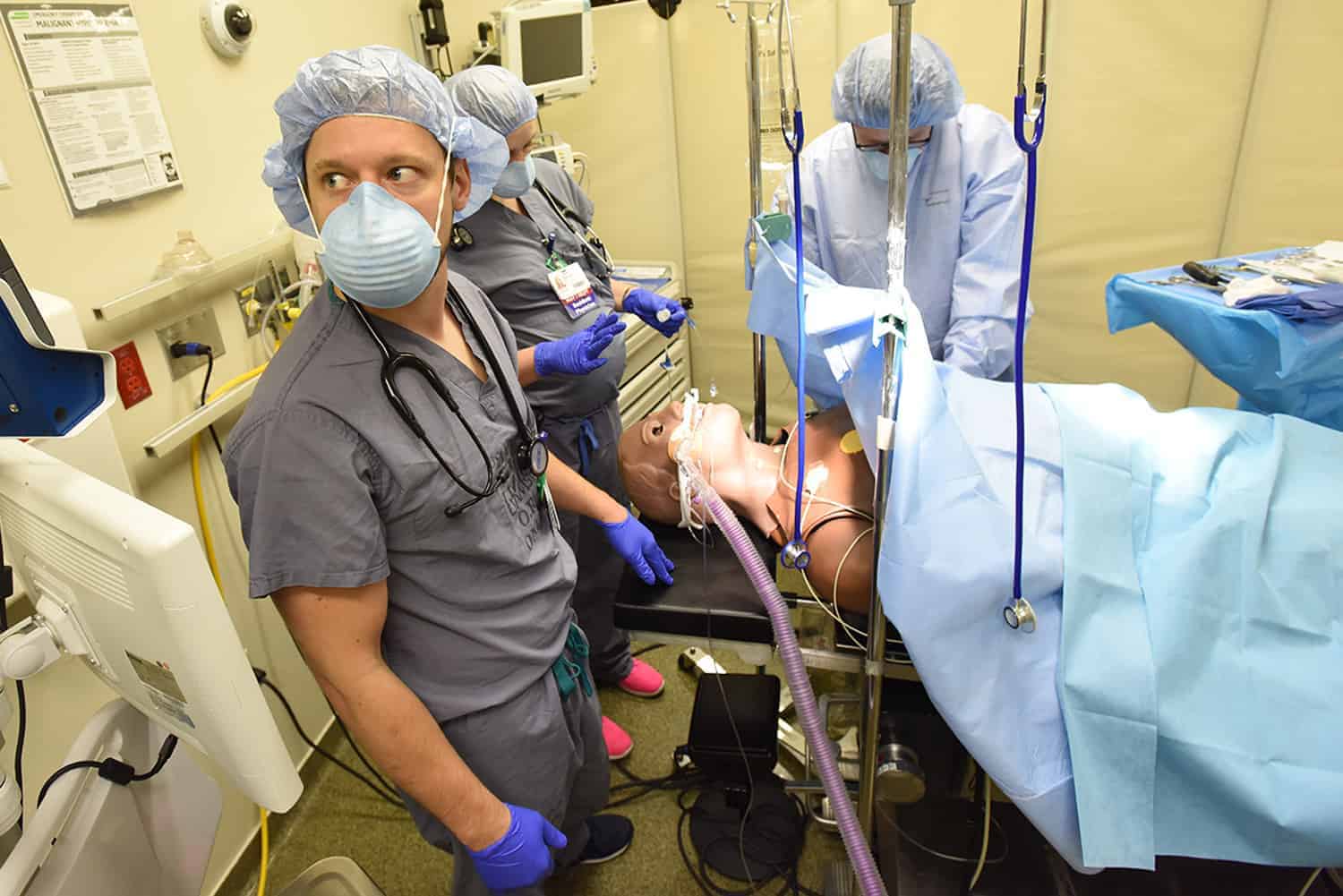UAMS Joins Nationwide Network to Offer Simulation Courses for Anesthesiologists
| Sept. 19, 2017 | The Simulation Center at the University of Arkansas for Medical Sciences (UAMS) has been recognized as a program of quality in anesthesiology simulation and approved by the American Society of Anesthesiologists (ASA) to offer educational courses for anesthesiologists to hone their skills and maintain their professional certifications.
The UAMS Simulation Center is now offering several per year one-day crisis management simulation trainings that are part of the American Board of Anesthesiology (ABA) Maintenance of Certification in Anesthesiology (MOCA) Program. Participants in the UAMS MOCA simulation course earn up to 25 MOCA Part 4 credits, the most time-efficient option for anesthesiologists to earn MOCA credits. The program is a collaboration of the UAMS Department of Anesthesiology, the Simulation Center, and the Office of Continuing Education.
The first course is Nov. 17 and anesthesiologists from across the nation have already enrolled. More information is available at moca.uams.edu.
UAMS is joining a nationwide network of sites endorsed by the ASA to offer MOCA trainings, including the Stanford University School of Medicine, Northwestern University, University of Chicago, the Mayo Clinic, Vanderbilt University, the Cleveland Clinic, Duke University, Harvard University and others.
The simulations include a setting that closely replicates an operating room, real equipment, computerized “patients” that can be programed to exhibit symptoms such as a rapid drop in heart rate during surgery and complications during labor and delivery, and challenging crisis scenarios, including power outage and fire in the operating room.
The training includes debriefing sessions during which participants reflect on their management of the situation, teamwork, potential for improvement and how to apply the lessons learned to their unique settings. UAMS educators will observe the simulation through a one-way mirror and guide the debriefing. The simulation scenario is filmed so participants can see a playback of themselves in action.
Previously, anesthesiologists from Central Arkansas had to travel to Dallas or further to take part in such trainings.
The Simulation Center serves all five colleges and the Graduate School at UAMS and the UAMS Medical Center. Training participants improves their skills and their ability to work collaboratively in teams across professions – doctors, nurses, pharmacists and many others.
The Simulation Center has had a well-established educational program for the anesthesiology students and residents training at UAMS for many years.
“Anesthesiology has embraced simulation,” said Michael Anders, Ph.D., director of education and research at the Simulation Center. “Anesthesiologists encounter emergencies during which they need to react quickly and follow appropriate steps. Simulation can help turn their reactions into dynamic decision making and improved team interactions during rare but important events when the patient’s life depends on it.”
Victor Mandoff, M.D., MOCA program director, practicing anesthesiologist and associate professor of anesthesiology at UAMS, agreed. He helped design the course and will lead it.
“When there is an actual emergency, seconds matter,” Mandoff. “You want your anesthesiologist to be trained for the worst-case scenario.”
Anders said research demonstrates that deliberate practice in simulation is an excellent way for all health professionals to keep their skills fresh.
Anders and Mandoff said the process of being endorsed by the ASA was rigorous and taught Simulation Center staff lessons they can apply to all their trainings.
“What we have already learned through the endorsement process is going to improve what we are able to offer all around,” Anders said. “At the end of the day, the improvements we make to the trainings we offer at the Simulation Center are about improving the quality and safety of patient care.”
UAMS is the state’s only health sciences university, with colleges of Medicine, Nursing, Pharmacy, Health Professions and Public Health; a graduate school; a hospital; a main campus in Little Rock; a Northwest Arkansas regional campus in Fayetteville; a statewide network of regional campuses; and eight institutes: the Winthrop P. Rockefeller Cancer Institute, Jackson T. Stephens Spine & Neurosciences Institute, Harvey & Bernice Jones Eye Institute, Psychiatric Research Institute, Donald W. Reynolds Institute on Aging, Translational Research Institute, Institute for Digital Health & Innovation and the Institute for Community Health Innovation. UAMS includes UAMS Health, a statewide health system that encompasses all of UAMS’ clinical enterprise. UAMS is the only adult Level 1 trauma center in the state. UAMS has 3,485 students, 915 medical residents and fellows, and seven dental residents. It is the state’s largest public employer with more than 11,000 employees, including 1,200 physicians who provide care to patients at UAMS, its regional campuses, Arkansas Children’s, the VA Medical Center and Baptist Health. Visit www.uams.edu or uamshealth.com. Find us on Facebook, X (formerly Twitter), YouTube or Instagram.###
